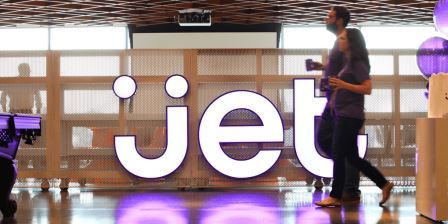Walmart Makes It Official, Acquires Jet.com for $3 Billion

After word leaked last night via Recode, Walmart officially announced Monday in an e-mailed statement that it has agreed to acquire Hoboken, NJ-based e-commerce site Jet.com for $ 3 billion cash, a strategic move touted by some as a way for the big box retailer to be more competitive with Amazon. Further sweetening the deal, Walmart said it will pay out some $ 300 million in shares over time.
Jet, barely out of diapers, launched its site about one year ago, offering deeper discounts as customers add more items to their online shopping carts.
This is a huge exit for a New York-area e-commerce company, especially given the high expectations and some major disappointments to come out of this ecosystem. Shai Goldman, managing director with Silicon Valley Bank, put the significance of Jet’s acquisition into perspective via Twitter.
NYC had several big ecommerce misses: Fab , Gilt, Quirky , nice to get a W on the board
— (((Shai Goldman))) (@shaig) August 8, 2016
In its statement, Walmart said the acquisition will further enhance its Walmart app, website, and stores to make faster moves in e-commerce. Moreover, Walmart is bringing on board Jet’s CEO and co-founder Marc Lore, who previously co-founded Quidsi, an e-commerce company that is the parent to Diapers.com, Wag.com, and Soap.com. Amazon acquired Quidsi back in 2010 for some $ 545 million. Jet co-founders Mike Hanrahan and Nate Faust were also part of the Quidsi team.
The plan, according to Walmart, is to maintain the distinct Jet.com brand and its assortments of products curated for its customers while Walmart.com continues to stick with it bread and butter of “everyday low prices.”
Of particular interest to Walmart is the draw Jet has with millennial and urban consumers; the company specifically cited the gains Jet.com made in a short amount of time attracting customers from those demographics.
Getting, and retaining, the patronage of consumers can be fiercely difficult in e-commerce. As Goldman noted in his tweet, the New York startup scene has had its share of hype and high hopes in this sector that later fizzled out. In January, Hudson’s Bay Co. acquired Gilt Groupe for $ 250 million, somewhat less than what investors had poured into the shopping site.
Last year, the original iteration of Quirky, a platform for marketing and selling inventions, filed for bankruptcy and then sold off all its assets, including smart home app developer Wink. Quirky has since resurfaced under new ownership, but without some of its more questionable products—such as an egg tray that tells the user when their food goes bad.
Fab.com was another shooting star from the New York startup community that made a splash in e-commerce as a curator and seller of well-designed products, and seemed to be on track to become huge with mainstream consumers. But after raising more than $ 300 million, and seeing a peak valuation of about $ 1 billion, Fab.com was sold to PCH International in 2015 for an undisclosed sum—some news outlets asserted the deal was for as little as $ 15 million to $ 50 million.
It should be noted that beyond the obvious big payday, there are some significant differences between Jet’s deal and those other New York exits. The leadership behind Jet had a notable track record of a solid return with Quidsi, which raised a bit more than $ 58 million and then was sold for $ 545 million. And while Jet.com did raise a considerable war chest of $ 565 million from investors, the company is being acquired a little more than one year after its launch. It hit hard and fast, rather than hold out until it lost its luster. Such a massive offer from Walmart is a rarity, but the end result is impossible to ignore.
(30)













